Our Fight to End FGM in The Gambia: Who is Listening?
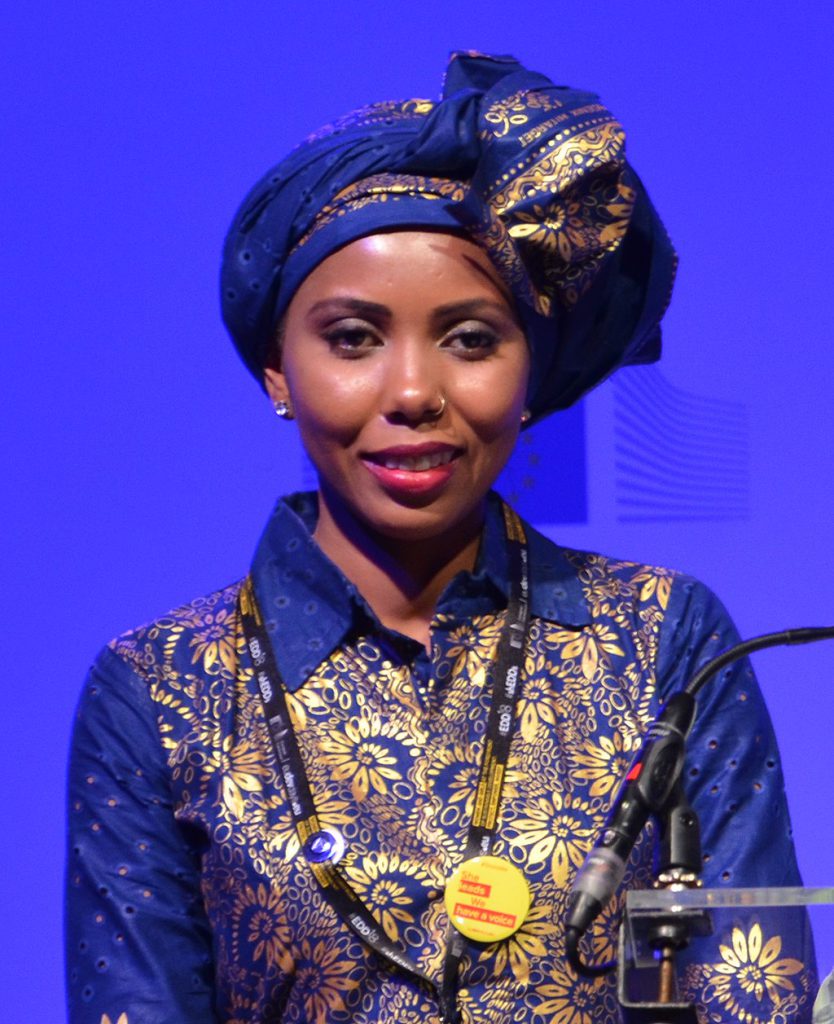
By: Jaha Dukureh, a Gambian anti-female genital mutilation campaigner and the founder and executive director of Safe Hands for Girls. Jaha was named TIME Magazine’s 100 Most Influential People for 2016 and was nominated for the Nobel Peace Prize in 2018. After I spent years campaigning to outlaw female circumcision, finally my country started to listen. In 2015, The Gambia banned Female Genital Mutilation (FGM) and imposed penalties on those who perform or practice it. As a survivor of FGM who played an instrumental role in this fight, I felt ecstatic when I heard the news. But it was a joy that wasn’t to last. If certain politicians have their way, the law will soon disappear and more young children will have to suffer the same pain I did. Some, like my half-sister, may lose their lives. As a survivor of FGM born and raised in The Gambia, a Serahule, and a proud Muslim, my journey has been one of pain, resilience, and unwavering determination. I have learned that it is important to recognize my roots and the challenges that come from speaking up, especially if you are a woman and of my background. Today, as I reflect on the challenges that lie ahead, I am compelled to raise my voice in defense of the progress that has been made in protecting our daughters, our sisters, and future generations of women and girls. I speak up for myself, for my generation, and for the millions of girls who will hear our story and say enough is enough. I will never perform this practice on my daughter. That statement, in itself, is the ultimate victory. And yet sadly, there are still many parents in The Gambia who are fighting for this practice to live on, ignoring our cries for it to end. Still, we refuse to be silenced and stand idly by as our daughters’ bodies are mutilated, their futures stolen, and their dreams shattered. That’s why, as the world celebrated women’s achievements during Women’s History Month in March, we launched a petition to stop the repeal of the ban on FGM in The Gambia. But to be effective – to actually be heard – we need all of you to help tell our parents, “Enough is enough.” Our campaign has given voices to many young girls who continue to unapologetically lead movements to help change social norms. But today, we also need to be honest with ourselves. As much as I am emotionally invested in the campaign, I have always recognized my limitations, especially when I decided to bring my campaign home. If you have the chance to watch Jaha’s Promise, you will understand what I am trying to explain. I was returning home to join a decades-long campaign to end this harmful practice, but it wasn’t easy. As young people, we developed a whole society approach to eradicating the practice. This required us to organize but also to engage with those who had different views than us. Those Gambians for whom FGM is considered a sacred passage that women have to go through. Those fathers, like mine, who gave consent to the practice without understanding what we go through. Like in many parts of Africa, FGM remains a deeply entrenched tradition in The Gambia, affecting a significant portion of the population. According to the United Nations Population Fund, 75 percent of women and girls aged 15-49 have undergone some form of FGM. This practice cuts across ethnic, religious, and cultural boundaries, affecting various communities nationwide. If lawmakers overturn the law now, the numbers will only increase. The proposed repeal is not just a legal issue; it is a moral imperative, a test of our humanity, and a reflection of our values as a society. It sends a dangerous message that the rights and dignity of girls are expendable, that their bodies are mere vessels for the preservation of harmful traditions. But we know better. We know that FGM is a violation of human rights, a form of violence against women and girls, and a practice that should end with us. That’s why we are mobilizing, organizing, and uniting to raise the alarm for the rights of all girls to live free from fear and harm. Our petition is more than just signatures on a page; it is a collective call to our parents to listen to the voice of reason and understand the harm that we go through. As a survivor, I know firsthand the pain and trauma inflicted by FGM. But I also know the power of resilience, the strength of solidarity, and the hope that springs from the darkest of places. Join me – join all of us survivors – as we raise our voices, protect our girls, and say no to the repeal of the ban on FGM in The Gambia. Sign our petition, raise awareness, and stand in solidarity with survivors of FGM. Together, we can protect our girls and build a world where every woman and girl is empowered to live a life of dignity, freedom, and equality. We owe it to our daughters, our sisters, and ourselves to mobilize our communities and demand accountability from our leaders. Our parents aren’t listening to us — our politicians aren’t listening to us — which is why we need your voice, too. With your help, our collective voices will be so loud they’ll be impossible to ignore. #StopFGMRepealGambia #ProtectOurGirls #EndFGM Jaha Dukureh, Founder & CEO of Safe Hands for Girls Council member Nalafem Collective The Gambia Related links: Behind the Wall by Gambian activist and FGC survivor Isatou Jallow UNICEF released new data on global prevalence of FGM/C
Sahiyo’s Second Annual Silent Auction & Comedy Show Reflection
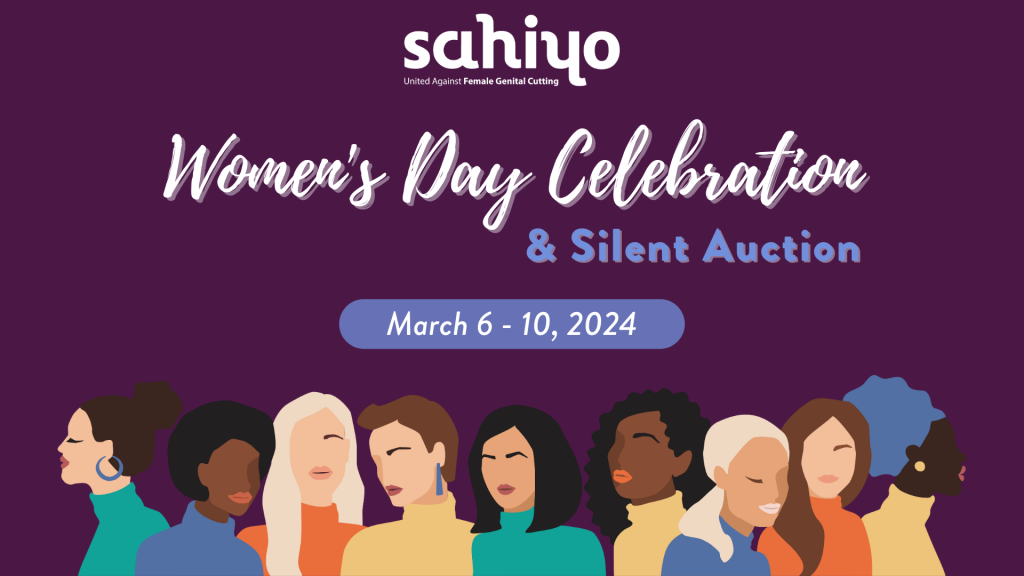
Thank you to everyone who participated in Sahiyo’s 2nd annual Women’s Day Celebration & Silent Auction! We are truly grateful for the show of support. With the help of our incredible donors and supporters, we raised over $13K. Our five-day celebration of women’s voices began on Wednesday, March 6, 2024, by opening our virtual auction stacked with some incredible donations from our supporters. Then we enjoyed a fun and interactive virtual live comedy show featuring incredible comedians, Zahra Noorbakhsh, Weyam Ghadbian, Pallavi Gunalan, and Mita Patel. Throughout the rest of the week, we highlighted talented women by sharing their gifts of inspiration, poetry, artwork, and much more on our social media platforms. We are especially appreciative of our sponsors who helped make this event possible: WeSpeakOut, Raziudin & Latifa Moosajee, and Tabassum Zalotrawala. Save the date for Sahiyo’s 3rd annual fundraising event which will be held March 5 – 9, 2025! Visit our website for more information or to sign up today.
Empowering Voices: The Launch of the Voices to End FGM/C Screening Guide
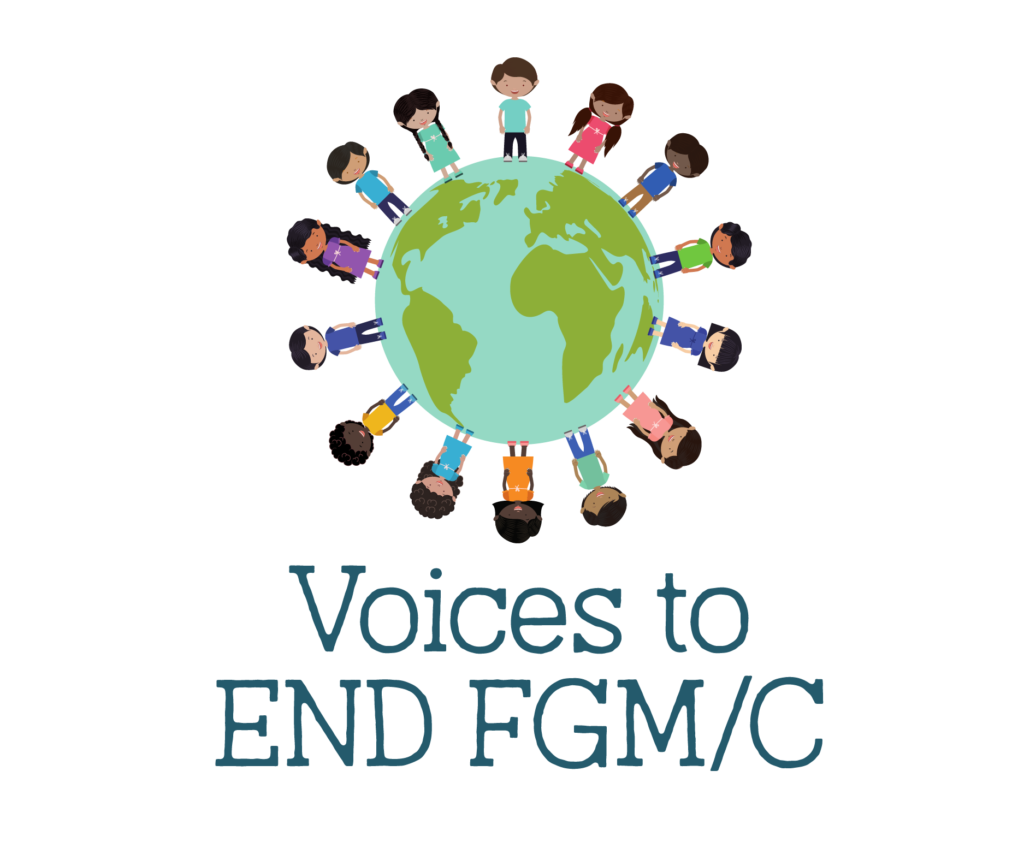
We are thrilled to announce the launch of the Voices to End FGM/C Screening Guide, an educational resource developed by Sahiyo, Silence Speaks, and the Asian Women’s Shelter. This guide marks a significant step forward in our collective efforts to amplify the voices of survivors, educate people, and mobilize communities to support ending female genital mutilation/cutting (FGM/C). Supported by the Wallace Global Fund and the Office for Victims of Crime, U.S. Department of Justice, the guide is designed to help everybody facilitate impactful screenings of digital stories by survivors, activists, and advocates. These stories are not just narratives; they are powerful testimonies of resilience, courage, and the human spirit’s ability to overcome. Why This Guide Matters FGM/C is a social norm justified by a variety of reasons, yet it carries significant implications for women’s health, rights, and well-being. The Voices to End FGM/C Screening Guide stands as a crucial step forward in our collective efforts to raise awareness, foster understanding, and drive change. The guide offers a wealth of tools and templates to assist in organizing screenings of Voices to End FGM/C videos, whether within organizations, schools, or informal gatherings. It aims to create a space for learning, reflection, and action, encouraging participants to move from awareness to advocacy. By hosting a screening, you contribute to a larger dialogue about human rights, gender equality, and the urgent need to end FGM/C. What You’ll Find Inside The guide serves as a comprehensive toolkit for anyone committed to ending FGM/C, providing the following information: Detailed screening guidelines Discussion prompts Event planning tools Resources for organizing engaging and informative screenings A selection of digital stories from our Voices project We encourage you to visit our Voices to End FGM/C website and browse through the diverse narratives from around the globe. Join the Movement By exploring the Voices to End FGM/C Screening Guide, you’re taking a significant step towards raising awareness and creating opportunities for dialogue. We hope this guide becomes more than just a resource; we want this guide to serve as a call to action for everyone who believes in the power of storytelling to inspire change. We invite you to join us in this vital movement. For any questions or to learn more about our Voices program, please reach out to us ataries@sahiyo.org. Related: Voices to End FGM/C 2023 Cohort Video Screening
Sahiyo’s Silent Auction Donor Spotlight: Arefa Cassoobhoy

Starting March 6th, Sahiyo will be hosting its second annual Women’s Day Celebration & Silent Auction with the goal of raising $15,000 in support of our work to end female genital cutting. The auction will open on Wednesday, March 6th and close on Sunday, March 10th. During this five-day fundraising event, we’ll celebrate women’s voices with comedy, video spotlights, stories, and entertainment. We’re incredibly grateful to all of our generous sponsors and supporters who have contributed some wonderful auction items. To uplift their work and thank them, we’re highlighting a few and why they support Sahiyo. And if you, too, would like to contribute in some way, click here to donate auction items, money, or sponsor the event. Today we’re profiling Arefa Cassoobhoy, who served as the chair of the Sahiyo U.S. advisory board in 2021-2023. She is also a board certified internal medicine physician and has held various senior editing and writing roles at the likes of Everyday Health, WebMD, and Medscape. When and how did your involvement with Sahiyo first begin? I discovered Sahiyo’s website online when I was researching FGC for my work at WebMD and Medscape back in 2018. There was an excellent media resource guide for reporting on FGC and I decided to reach out to speak with Mariya Taher, the U.S. Executive Director to learn more. She was incredibly helpful with the articles and videos and we stayed connected afterwards. We then met at the American Public Health Association national meeting and by 2019 I had joined Sahiyo’s U.S. Advisory Board. Why did you decide to donate to Sahiyo’s silent auction? What does the event mean to you? I’ve worked with Mariya and her team for a few years now, and I have been impressed by how much work they do and also the breadth of their work. From educating healthcare professionals and providing support for survivors, [to] addressing legal issues, planning Activist Retreats and the Voices to End FGM/C workshops, it’s a lot for a small organization. They’ve done a great job building on their successes so every year they’re expanding and fine tuning their projects. So I feel like the money is really well spent. The more they’re able to do, the better. The silent auction and comedy show are a great way to expose more people through a fun event to Sahiyo’s work. I’m looking forward to having people over to my house and sharing with them information about FGC. What did you donate? I’m committed to Sahiyo and their work and give a monthly recurring donation. Also this year I’ve bought a VIP watch party ticket for the Women’s Day Celebration comedy show. I’ve catered the meal from a local nonprofit and have invited guests who I hope will take advantage of the many great items listed in the silent auction portion of the celebration! Many have already donated generously. How would you like to see your donation help Sahiyo grow? I hope it helps in continuing to grow existing programs at Sahiyo. I really appreciate their multi pronged approach of educating healthcare providers so that appropriate care can be given to survivors in the U.S. And also how Sahiyo encourages conversations that allow people to talk about [FGC], especially the Voices to End FGM/C workshop. I think there’s a lot of healing that happens there, and ultimately stopping FGC from happening to more people. And with Mariya’s leadership, and all the other staff members, they really listen to people. So when someone brings up an idea, they remember it, they make notes. and they follow up. They’ll create a project or a program on a small scale, and then refine it before expanding it. That has given me a lot of confidence that the projects and programs that come out of Sahiyo are really thoughtful and scalable. They truly reflect what the audience is asking for and their needs and wants. They don’t rush it. So I hope my donation helps Sahiyo as they are expanding. Related: Read about our other inspiring supporters in our Silent Auction Donor Spotlight 2024 series
Pathways to Progress: Community Engagement in Ending Female Genital Cutting
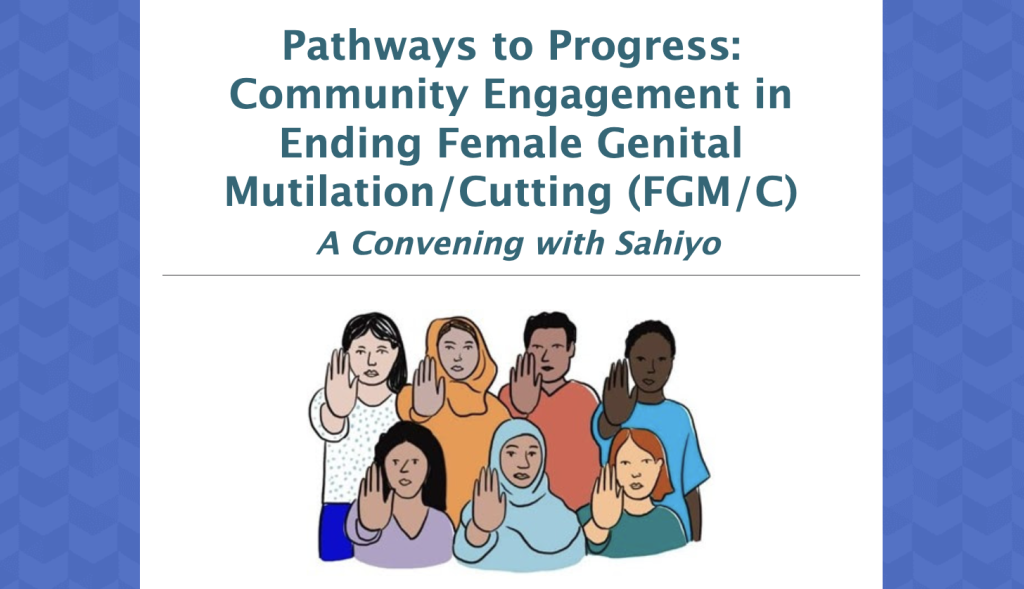
Date: March 18, 2024 Time: 9AM-10:30AM Pacific/ 12PM-1:30PM Eastern Register here: https://bit.ly/RTIxSahiyo. On March 18, Sahiyo and other FGM/C advocates will discuss the pivotal role community engagement plays in raising awareness of FGM/C and ultimately ending the practice. Led by Sahiyo’s U.S. Executive Director Mariya Taher, panelists will share effective ways to engage with FGM/C impacted communities. We invite everybody to attend the virtual panel discussion! Speakers will include: Wonder Guannu, who is the African Cultural Alliance of North America’s Project Coordinator for the FGM/C Project in Philadelphia Samman Masud, who is Sahiyo’s Community Engagement Coordinator Breanne Lash, who is the Director of Programs for Nile Sisters Development Initiative in Los Angeles and San Diego Who should attend this virtual event? Anybody who wants to increase engagement with individuals and communities impacted by FGM/C. What will the event be about? Panelists will share diverse case studies, illustrating real-world examples of community engagement in this field. These discussions will dive into the intricacies of building partnerships, mobilizing resources, influencing systems, and sustaining community and individual-level involvement to improve the wellbeing of those affected by FGM/C. Attendees will: Gain valuable insights into the challenges and successes of initiatives to address FGM/C Learn and be inspired by the power of community engagement in creating impact Gain knowledge about specific strategies Have the opportunity to discuss any workshop approaches that they have used in their communities Register for the event here: https://bit.ly/RTIxSahiyo. After registering, you will receive a confirmation email containing information about joining the meeting. PS: Sahiyo’s Silent Auction fundraising event kicks off on March 6-10 while the Live Virtual Comedy Show will take place on March 7. We aim to raise $15,000 in support of our work. Click here to donate auction items, money, or sponsor the event.
From Rhetoric to Reality: Closing the Funding Gap to End FGM/C

From political to personal, ending female genital mutilation (FGM/C) requires a multifaceted approach that includes funding. Sadly, a lack of adequate funding has created a real obstacle in our effects to enact change, which is why The Global Platform for Action to End FGM/C in partnership with the United States Mission to the United Nations is hosting “From Rhetoric to Reality: Closing the Funding Gap to End FGM/C”, a parallel event at the 68 U.N. Commission on the Status of Women meetings this March. Date: Friday, March 15, 2024 Time: 4:30-6:00 PM ET Where: Church Center United Nations, 10th Floor, , New York, NY 10017 Register: https://bit.ly/FundFGMC Cost: Free This event will explore innovative options and call for solutions to close the funding gap. Event objectives include: Highlight the funding gap with an emphasis on the global nature of FGM/C and the funding needs globally. Share new findings on the landscape of FGM/C funding, identify strategic entry points. Bring in new stakeholders to commit to funding anti-FGM/C programming, promote dialogue between CSOs, activists and funders and mobilise multi-stakeholder partnerships. Secure support for a Global Commitment Summit to attract funding to the sector. Related: Reflecting on Investing in Girls and Women: Unleashing the Power of Philanthropy to End FGM/C PS: While we’re on the subject, Sahiyo’s Silent Auction fundraising event kicks off on March 6-10 while the Live Virtual Comedy Show takes place on March 7. We aim to raise $15,000 in support of our work. Click here to donate auction items, money, or sponsor the event.
Sahiyo’s Silent Auction Donor Spotlight: Kaneez Madraswalla
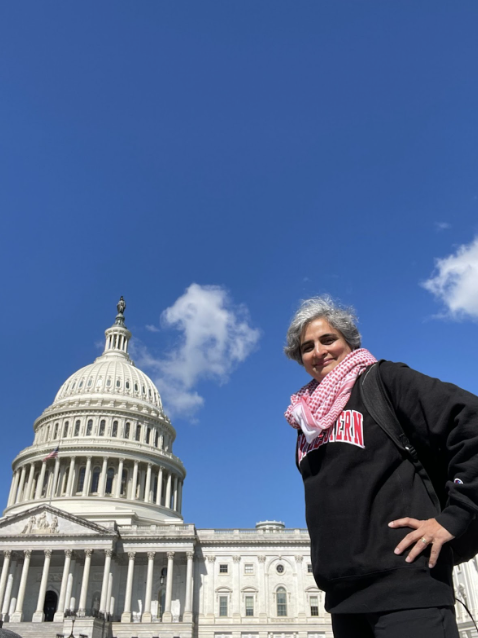
Sahiyo U.S. will host its second annual Women’s Day Celebration & Silent Auction with the goal of raising $15,000 in support of our work to end female genital cutting. The auction will open on Wednesday, March 6th, 2024 and close on Sunday, March 10th, 2024. During this five-day fundraising event, we’ll celebrate women’s voices with comedy, video spotlights, stories, and entertainment. We’re incredibly grateful to all of our generous sponsors and supporters who have contributed some wonderful auction items. To uplift their work and thank them, we’re highlighting a few and why they support Sahiyo as a part of larger series. And if you, too, would like to contribute in some way, click here to donate auction items, money, or sponsor the event. Yesterday, we profiled Zehra Patwa. Today, we’d like to introduce our second donor: Kaneez Madraswalla. Kaneez is Sahiyo’s U.S. Advisory Board Member and a trained lawyer. She works as the Vice-President of Compliance at QBE North America, where she also co-leads the QBE Women’s Initiative Network. Kaneez believes that participating in volunteer work allows individuals to contribute meaningfully to their communities while fostering personal growth, empathy, and empowers women to support and uplift each other, and is passionate about embodying this in her involvement with Sahiyo and other activism. When and how did your involvement with Sahiyo first begin? I first became aware of Sahiyo and its mission through my conversations with a Board member, Zehra Patwa, almost ten years ago. Why did you decide to become a donor for Sahiyo’s Silent Auction? What does giving to Sahiyo mean to you? As a newly inducted Board member, I wanted to make an impact by raising awareness of the issue and normalizing conversations surrounding the mission of Sahiyo. Giving to Sahiyo represents a commitment to ending a harmful practice, supporting survivors, empowering women and girls, and advocating for positive change in communities affected by FGC – especially the Dawoodi Bohra community, of which I am a member. What did you donate or contribute? I am hosting a watch party at my home with an expected attendance of 30 people. How would you like to see your donation help Sahiyo grow? While I understand the money raised will help Sahiyo programming and outreach, I am most excited about raising awareness of this issue and introducing others to Sahiyo and its work. Why do you think others should donate to Sahiyo? One of the things I look for when I donate to an organization, other than its mission, is to see the direct impact my contribution has and what it means to the organization. Sahiyo is a small, grassroots organization where every dollar counts. It is spearheaded by folks who are so very passionate about Sahiyo’s mission and are deeply committed to making a difference! Related: Read about our other inspiring supporters in our Silent Auction Donor Spotlight 2024 series Sahiyo welcomes Kaneez Madraswalla as new U.S. Advisory Board Member
Sahiyo’s Silent Auction Donor Spotlight: Zehra Patwa
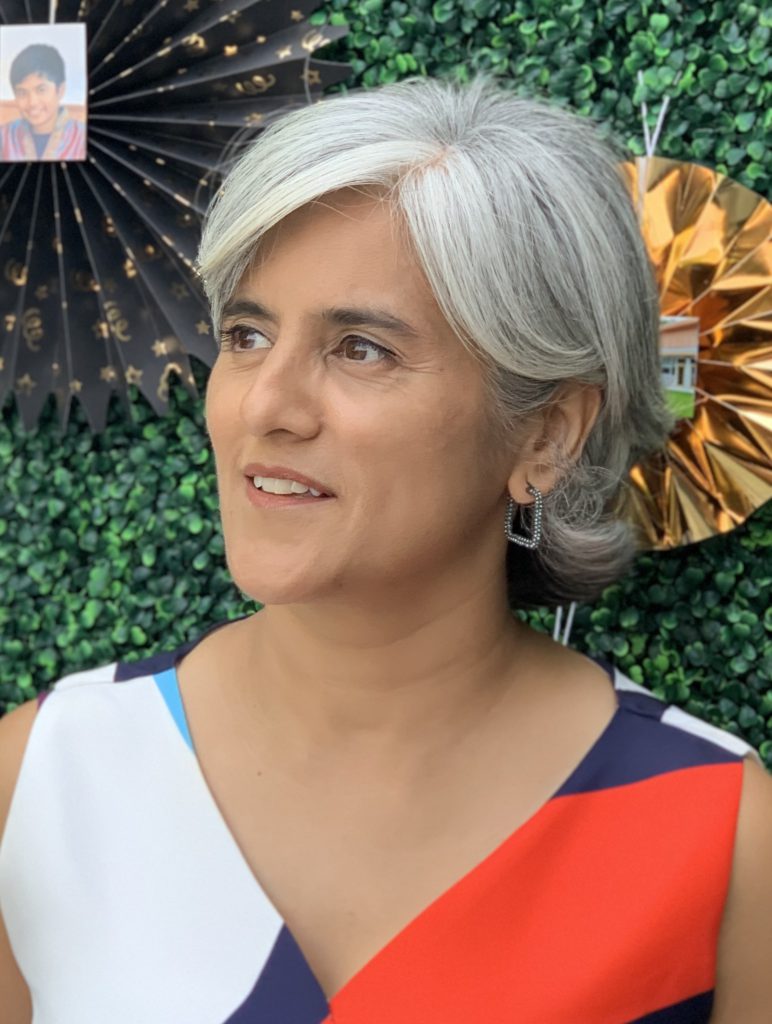
Sahiyo U.S. will host its second annual Women’s Day Celebration & Silent Auction with the goal of raising $15,000 in support of our work to end female genital cutting. The auction will open on Wednesday, March 6th, 2024 and close on Sunday, March 10th, 2024. During this five-day fundraising event, we’ll celebrate women’s voices with comedy, video spotlights, stories, and entertainment. We’re incredibly grateful to all of our generous sponsors and supporters who have contributed some wonderful auction items. To uplift their work and thank them, we’re highlighting a few and why they support Sahiyo. And if you, too, would like to contribute in some way, click here to donate auction items, money, or sponsor the event. Today, we’re profiling Zehra Patwa, who serves on Sahiyo’s U.S. Advisory Board. She is also the co-founder of WeSpeakOut, an organization that advocates for Bohra women and their rights. WeSpeakOut is particularly focused on ending FGM/C in the Bohra community and banning it altogether. When and how did your involvement with Sahiyo first begin? After I found out that khatna (FGC) was happening in my community, my cousin put me in touch with a WhatsApp group of several Bohra women [in 2015], which included the founders of Sahiyo as well as the future founder of WeSpeakOut. I was intrigued because I had never heard anybody talk about the practice like this. All the conversations I’d previously had about cutting with female members of my family were like, “It just happens. You just do it and you just move on with your life.” But in this WhatsApp group, people were talking about how to stop this generations-old practice. It was really refreshing to be with a group of Bohra women who were not going to take it any longer and were like, “we’re not going to let this happen to our daughters. We’re not going to let it happen to any girls.” Typically, Bohra people are quite compliant – we tend to be peaceful and don’t want to rock the boat. We’re afraid of what people might think, so the conversations in this group were very powerful. So, that’s how it all started, and now I’m on the Advisory Board! Mariya [Taher] has been an incredible inspiration. She has really helped me develop as an activist, and the Activist Retreat in particular has helped me. I think the retreat has been one of the highlights for me personally in my activism, so, that’s why we need the auction to keep these programs going. Why did you decide to become a donor for Sahiyo’s Women’s Day Celebration and Silent Auction again? What does giving to Sahiyo mean to you? I have been connected with Sahiyo since close to its inception and I’ve seen what an impact it’s made, and continues to make. Sahiyo as an organization has become so well-organized and expansive in its reach, and through its work, many people are recognizing that FGC is a practice that happens right here in the US. The more impactful Sahiyo becomes, the fewer girls get cut and the more girls are protected. I know many people have benefited from Sahiyo’s programs, survivors and activists alike. As activists, we very often keep on, burn out, rest, and then do it all over again, but Sahiyo and programs like the Activist Retreat have allowed us to carry on and not get burned out. It’s really important to know that there is support out there as that keeps these important conversations going. What did you donate or contribute this year? I’m hosting a watch party again this year and my two artist friends are working on pieces for the auction. They both donated pieces last year, both of which were very popular so I’m excited to see what they come up with this year! How would you like to see your donations help Sahiyo grow? I’d like to see Sahiyo become an independent nonprofit. I think by being an independent nonprofit, we’ll be able to do so much more in terms of certain grants and certain programs that we can apply to. Being a fiscally sponsored nonprofit limits us a little bit and I think we’ve grown to a point where we’re really ready to become independent. I think we’re in a really good place and that will then extend our reach even more and allow us to have that kind of wider exposure, which would lead to greater social change. Why do you think others should donate to Sahiyo? Everyone should donate to Sahiyo because it is doing such good work that impacts so many people. I think the impact is even greater than we recognize because this practice is such an underground issue. It’s not something people openly talk about, but I’ve had people pull me aside to tell me, “I can’t say anything publicly, but I really support the work you do.” And that’s really powerful. So I think there are a lot more people impacted by the work than we even know and I think that will really help to eliminate the practice down the road. By supporting Sahiyo, more people can be reached and even if people don’t admit in public that they won’t cut their daughters, if they decide to stop the practice in their families, this harmful traditional practice will eventually die out. Related: Zehra Patwa on Sahiyo and the Coalition to End FGM/C’s recent panel discussion with Connecticut legislators – and why it was a positive step forward I don’t remember my khatna. But it feels like a violation Read about our other inspiring supporters in our Silent Auction Donor Spotlight 2024 series
Milken Institute School of Public Health, Sahiyo, and other Community Partners Receive DOJ Grant to end FGC

Sahiyo U.S. is pleased to announce we’ve been awarded a grant alongside George Washington University’s Milken Institute School of Public Health, U.S. End FGM/C Network, and Global Woman PEACE Foundation from the Department of Justice’s Office on Violence Against Women (OVW) to develop training programs, prevention strategies, and education on FGM/C. “FGM/C is an issue I’ve known about my entire life.This partnership between our various organizations highlights something as a child I never thought possible, a public recognition that FGM/C is a concern in the U.S.,” said Mariya Taher, Executive Director of Sahiyo U.S. “It is significant that the OVW is recognizing the importance of addressing FGM/C in the United States, and that understanding its intersections with other forms of violence against women is crucial,” said Caitlin LeMay, the Executive Director of the U.S. End FGM/C Network. Read the full article here.
Mariya Featured on Maitri’s Between Friends Podcast
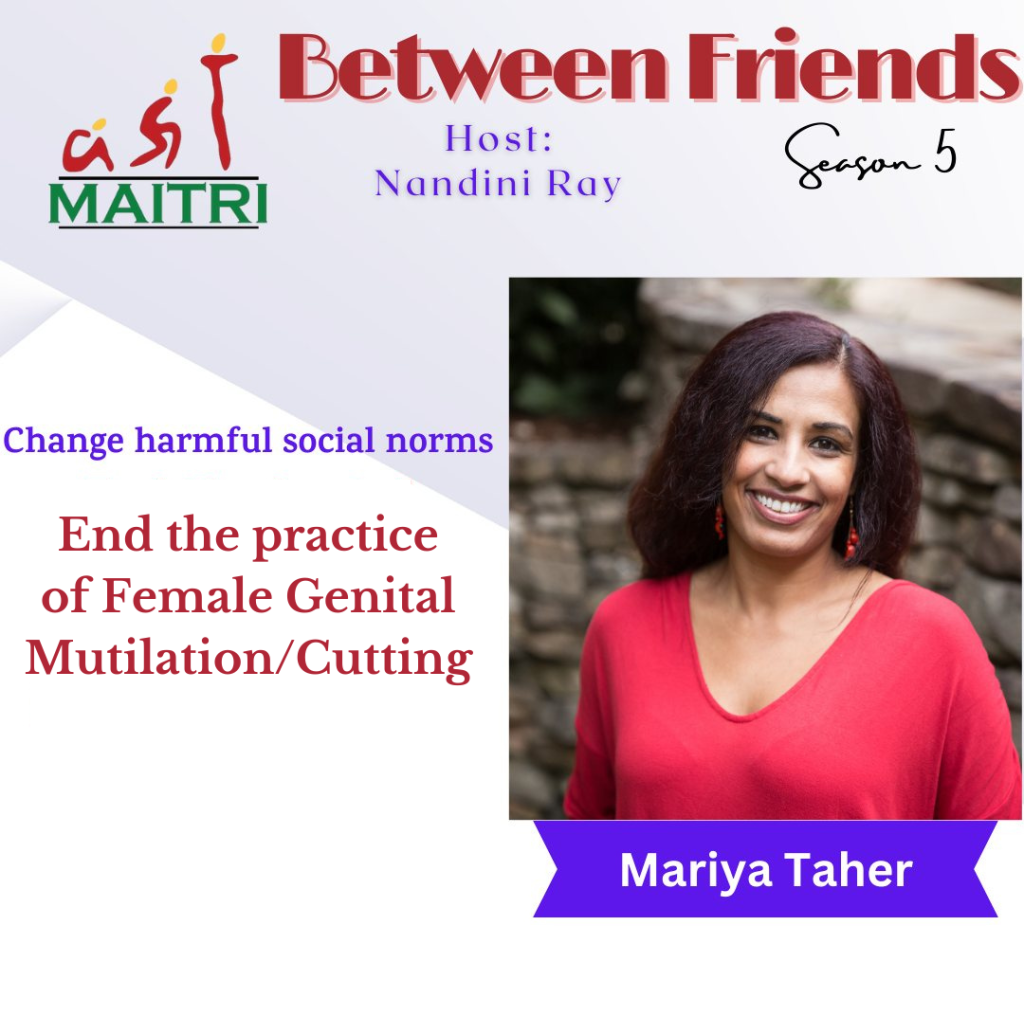
This past month Sahiyos co-founder and U.S. Executive Director, Mariya Taher participated in an episode of Maitri’s, Between Friends Podcast. The episode focused on the taboos surrounding FGC and why speaking about the practice, both in public and community settings is vital to help end the practice. Maitri is an organization that supports South Asian women who have been through or are currently in situations of domestic violence. Over the years their work has expanded to include providing survivors with mental and legal support, creating training programs, and educating communities on the impacts of domestic violence. To learn more about Maitri’s work, click here. Listen to Mariya’s episode here: YouTube Spotify SoundCloud Link
